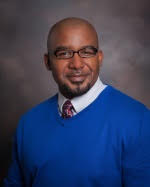By Jeff Brumley
Baptist minister Terrell Carter felt he could identify when a police officer fatally shot Michael Brown in Ferguson, Mo., last August.
“I know what it’s like to be racially profiled,” said Carter, who is African-American. “But on the flip side, I am a former St. Louis police officer and I know what it must have been like for the cop.”
The months of firestorm that followed that shooting, with protesters opposing police brutality and police complaining they were targeted and abused, Carter, 41, said he felt both sides needed to chill.
“We all need to stop and wait because there is going to be a lot more to this than anyone imagined.”
Not wanting to stop at penning a few columns on the subject, Carter recently published Walking the Blue Line: A Police Officer Turned Community Activist Provides Solutions to the Racial Divide.
And while Carter certainly proposes those solutions, he does so much more than that as a former police officer who is black.
He is executive director of the North Newstead Association, a community development corporation that builds affordable housing and manages community-based services for the City of St. Louis.

Carter also serves as the site coordinator and director of a ministry program for Central Baptist Theological Seminary in St. Louis.
And he’s been directly involved in church ministry with Missionary Baptist, Southern Baptist and Cooperative Baptist churches — including some while still in uniform from 1997 to 2002.
“I understood my call to ministry when I was 16 years old and began preaching when I was 17,” he told Baptist News Global. “I just knew God was calling me to do something more for the kingdom.”
Racial profiling
But his foray into law enforcement interrupted that calling.
“I became a police officer because I needed a job,” he said. “I thought I could make an impact as a cop, but it was a job.”
Still, looking back on it, Carter said God’s hand can be discerned in police work.
“You could say it’s a calling because any position where you are working with all kinds of people, including in volunteer settings, there is such a sacrifice because you are giving so much of yourself.”
But that was sometimes left behind as Carter found himself doing the very things other police officers do: profiling by race or economic status.
“It’s easy to profile based just on the neighborhood,” he said.
“The problem is you get into ruts when you see the same types of people on a daily basis,” Carter said. “I got to where I didn’t trust anyone but my family. Everybody else started to look the same.”
Once Carter began to notice such behaviors in himself, he tried to stop. “I intentionally tried not to be that person.”
Racism in churches, too
During this time he began pursuing formal theological studies, and eventually earned degrees in Bible and organizational leadership, a master’s in arts management and a doctor of theology. He is nearing completion of a doctor of ministry from Central Seminary.
He served as an interim pastor and associate pastor for several churches while still a police officer. For the past six years he served on the staff at Third Baptist Church in St. Louis.
It’s been in worshiping and working in churches that Carter said he noticed that Christians can be just as racist as law enforcement agencies have been accused of being.
It’s something he has not only witnessed but experienced as half of an interracial couple. He said he and his family have been received awkwardly by white and black congregations.
“The problems of race are not just confined to police departments,” Carter said. “They are still prevalent in the church today.”
Acknowledging sin
As he does in his book, Carter suggests the solution for all those claiming victim status in police-versus-community disputes take a look at how they can create healing change from within both themselves and their organizations.
It also means doing as critics suggest and re-evaluating existing policies, he said.
“Those who are in leadership, whether in police departments or denominations, we have to acknowledge that when these things are pointed out to us that we are not treating everyone like God’s children,” he said.
For example, are all leaders in the department or church white?
“Then re-examine what God is looking for and what it is that God wants instead of getting defensive,” Carter said.
In his book, Carter said blaming cops or African-American men for everything is an old, bad human habit.
“But,” he writes, “we must also recognize that it is easier for us to point out the sins and grievances of someone else before we acknowledge our own sins or the sins of our children.”
